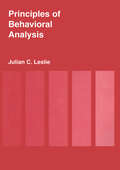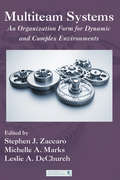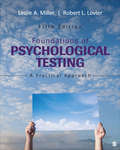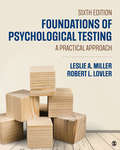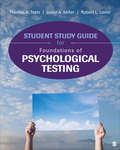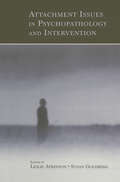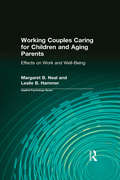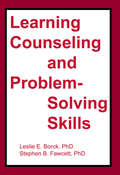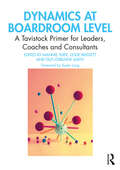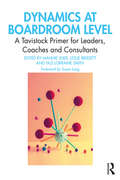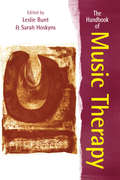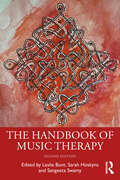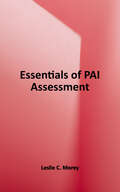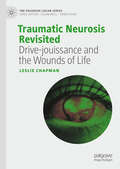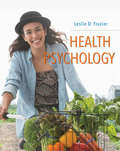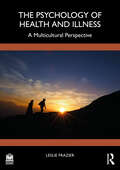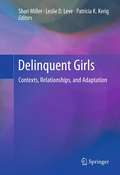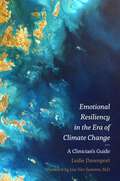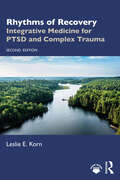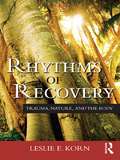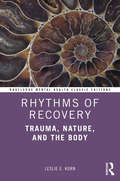- Table View
- List View
Principles of behavioural analysis
by LeslieFirst published in 1996. Routledge is an imprint of Taylor & Francis, an informa company.
Multiteam Systems: An Organization Form for Dynamic and Complex Environments (Organization and Management Series)
by Stephen J. Zaccaro Michelle A. Marks Leslie A. DeChurchThis book examines an emerging organizational form called the multi-team system (MTS). This type of aggregation is being increasingly adopted by organizations and agencies that need to respond to complex strategic problems. There has been increasing interest in MTSs over the last decade to the point where there is now a need to (a) describe these organizational forms more fully, (b) build conceptual frames that can guide research, and (c) begin developing tools to improve the study of MTSs. The purpose of this book is to respond to these needs. The book contains a series of chapters that expand prior conceptual frames of MTSs, defining in more detail the compositional and linkage attributes that characterize such units. The book also explores how such systems emerge and develop, as well as the methods for studying MTSs. The intent of the book is to establish and nurture a strong conceptual and methodological foundation that can guide research and practice with MTSs. Because the notion of MTSs cuts across multiple domains, this book will interest scholars in industrial/organizational psychology, organizational science, management and organizational theory, human factors, sociology, organization communications, and public administration.
Foundations of Psychological Testing
by Leslie A. Miller Robert L. Lovler Sandra A. McintireAuthors Sandra McIntire and Leslie Miller have accomplished what few before them have been able to. They have written a Psychological Testing book that is designed to lay a true foundation for learning and understanding. The primary objective of this text is not to dwell on the details of individual psychological tests, but to focus on the core concepts/psychometrics required to gain an appreciation of how to use the tests properly. Written in response to a growing need for a textbook on psychological testing conducive to maximal student learning, An Introduction Psychological Testing, gives students an understanding of the basic concepts, issues and tools used in psychological testing. It then effectively illustrates how these concepts, issues, and tools are relevant to them in everyday educational, clinical, and organizational settings.
Foundations of Psychological Testing: A Practical Approach
by Leslie A. Miller Robert L. LovlerOffering a clear introduction to the basics of psychological testing as well as to psychometrics and statistics, Foundations of Psychological Testing: A Practical Approach, Fifth Edition by Leslie A. Miller and Robert L. Lovler is a practical book that includes discussion of foundational concepts and issues, using real-life examples and situations that students will easily recognize, relate to, and find interesting. A variety of pedagogical tools further the conceptual understanding needed for effective use of tests and test scores. Now aligned with the 2014 Standards for Educational and Psychological Testing, the Fifth Edition offers new and expanded content throughout.
Foundations of Psychological Testing: A Practical Approach
by Leslie A. Miller Robert L. LovlerOffering a clear introduction to the basics of psychological testing as well as to psychometrics and statistics, Foundations of Psychological Testing: A Practical Approach, Fifth Edition by Leslie A. Miller and Robert L. Lovler is a practical book that includes discussion of foundational concepts and issues, using real-life examples and situations that students will easily recognize, relate to, and find interesting. A variety of pedagogical tools further the conceptual understanding needed for effective use of tests and test scores. Now aligned with the 2014 Standards for Educational and Psychological Testing, the Fifth Edition offers new and expanded content throughout.
Foundations of Psychological Testing: A Practical Approach
by Leslie A. Miller Robert L. LovlerFoundations of Psychological Testing: A Practical Approach by Leslie A. Miller and Robert L. Lovler presents a clear introduction to the basics of psychological testing as well as psychometrics and statistics. Aligned with the 2014 Standards for Educational and Psychological Testing, this practical book includes discussion of foundational concepts and issues using real-life examples and situations that students will easily recognize, relate to, and find interesting. A variety of pedagogical tools furthers the conceptual understanding needed for effective use of tests and test scores. The Sixth Edition includes updated references and examples, new In Greater Depth boxes for deeper coverage of complex topics, and a streamlined organization for enhanced readability.
Foundations of Psychological Testing: A Practical Approach
by Leslie A. Miller Robert L. LovlerFoundations of Psychological Testing: A Practical Approach by Leslie A. Miller and Robert L. Lovler presents a clear introduction to the basics of psychological testing as well as psychometrics and statistics. Aligned with the 2014 Standards for Educational and Psychological Testing, this practical book includes discussion of foundational concepts and issues using real-life examples and situations that students will easily recognize, relate to, and find interesting. A variety of pedagogical tools furthers the conceptual understanding needed for effective use of tests and test scores. The Sixth Edition includes updated references and examples, new In Greater Depth boxes for deeper coverage of complex topics, and a streamlined organization for enhanced readability.
Student Study Guide for Foundations of Psychological Testing
by Leslie A. Miller Robert L. Lovler Thomas A. StetzThe Student Study Guide for Foundations of Psychological Testing has 15 chapters corresponding to those in the main textbook and follows a consistent structure for quick and easy access to key information. To help students understand and apply material related to psychological testing, authors Thomas A. Stetz, Leslie A. Miller, and Robert L. Lovler offer overviews, learning objectives, outlines, key concepts, crossword puzzles, tips by learning objective, additional exercises, additional learning activities, practice questions, and answer keys.
Student Study Guide for Foundations of Psychological Testing
by Leslie A. Miller Robert L. Lovler Thomas A. StetzThe Student Study Guide for Foundations of Psychological Testing has 15 chapters corresponding to those in the main textbook and follows a consistent structure for quick and easy access to key information. To help students understand and apply material related to psychological testing, authors Thomas A. Stetz, Leslie A. Miller, and Robert L. Lovler offer overviews, learning objectives, outlines, key concepts, crossword puzzles, tips by learning objective, additional exercises, additional learning activities, practice questions, and answer keys.
Attachment Issues in Psychopathology and Intervention
by Susan Goldberg Leslie AtkinsonTo be a human being (or indeed to be a primate) is to be attached to other fellow beings in relationships, from infancy on. This book examines what happens when the mechanisms of early attachment go awry, when caregiver and child do not form a relationship in which the child finds security in times of uncertainty and stress. Although John Bowlby, a psychiatrist and psychoanalyst, originally formulated attachment theory for the express purpose of understanding psychopathology across the life span, the concept of attachment was first adopted by psychologists studying typical development. In recent years, clinicians have rediscovered the potential of attachment theory to help them understand psychological/psychiatric disturbance, a potential that has now been amplified by decades of research on typical development. Attachment Issues in Psychopathology and Intervention is the first book to offer a comprehensive overview of the implications of current attachment research and theory for conceptualizing psychopathology and planning effective intervention efforts. It usefully integrates attachment considerations into other frameworks within which psychopathology has been described and points new directions for investigation. The contributors, who include some of the major architects of attachment theory, link what we have learned about attachment to difficulties across the life span, such as failure to thrive, social withdrawal, aggression, anxiety, depression, bipolar disorder, dissociation, trauma, schizo-affective disorder, narcissistic personality disorder, eating disorders, and comorbid disorders. While all chapters are illuminated by rich case examples and discuss intervention at length, half focus solely on interventions informed by attachment theory, such as toddler-parent psychotherapy and emotionally focused couples therapy. Mental health professionals and researchers alike will find much in this book to stimulate and facilitate effective new approaches to their work.
Working Couples Caring for Children and Aging Parents: Effects on Work and Well-Being (Applied Psychology Series)
by Margaret B. Neal Leslie B. HammerAs the baby boomer generation approaches midlife, many dual-earner couples are struggling with issues of simultaneously caring for children while tending to aging parents. This timely book uncovers the circumstances faced by these workers, known as the “sandwiched generation”, and identifies what they need in order to fulfill their work and family responsibilities. Authors Margaret B. Neal and Leslie B. Hammer suggest the workplace as an arena for change, proposing that it adapt to the situations of today’s workers by providing flexibility and understanding the needs and priorities of families. Based on a four-year national study funded by the Alfred P. Sloan Foundation, Working Couples Caring for Children and Aging Parents examines: employer and governmental initiatives affecting work and family life in the United States; supports provided to working caregivers in countries other than the United States; the effects of being “sandwiched” on work-family fit, well-being, and work; and changes in work and family roles and outcomes over time. This book will interest a broad audience, including students, policymakers, family care practitioners, IO psychologists, work-life professionals, gerontologists, sociologists, human resource managers, and occupational health psychologists.
Learning Counseling and Problem-Solving Skills
by Stephen B Fawcett Leslie Borck-JamesonAn excellent tool for teaching counseling and problem-solving skills, this instructive volume focuses on the how-tos of developing a good client-helper relationship.
Dynamics at Boardroom Level: A Tavistock Primer for Leaders, Coaches and Consultants
by Leslie Brissett Mannie Sher Tazi Lorraine SmithHow can boards and members of boards reach their full potential? The Tavistock Institute of Human Relations (TIHR) has been at the forefront of thinking about organizations since its inception in 1947. Today, as then, the corporate world is undergoing increasing pressure to demonstrate a sustainable, generative and meaningful impact on society and employees whilst delivering improved services and products. These tensions and others are explored in this important new book, Dynamics at Boardroom Level: A Tavistock Primer for Leaders, Coaches and Consultants. In this book, the reader gets a useful framework of theory and practice that broadens vision and deepens thinking about what is happening in boardrooms. The book opens the door to the reader to a new world of board dynamics, edited by those who really understand the deeper workings of the complex human system and its work at board level. This edited volume brings together the insights and contemporary case studies from participants on the Tavistock Institute Dynamics @ Board Level programme that draws on the thinking of Tavistock scholars and practitioners and their work on the dynamics of task, role, authority and power. Edited by programme co-directors Dr Mannie Sher and Dr Leslie Brissett and their fellow Tavistock Associate Tazi Lorraine Smith, and with contributions from senior leadership practitioners and board evaluators from the government, international consultancy firms, FTSE 100 and global UN institutions, this book speaks directly to issues of our time. It represents essential reading for leaders of organizations and businesses, as well as leadership coaches and mental health professionals.
Dynamics at Boardroom Level: A Tavistock Primer for Leaders, Coaches and Consultants
by Susan Long Leslie Brissett Mannie Sher Tazi Lorraine SmithHow can boards and members of boards reach their full potential? The Tavistock Institute of Human Relations (TIHR) has been at the forefront of thinking about organizations since its inception in 1947. Today, as then, the corporate world is undergoing increasing pressure to demonstrate a sustainable, generative and meaningful impact on society and employees whilst delivering improved services and products. These tensions and others are explored in this important new book, Dynamics at Boardroom Level: A Tavistock Primer for Leaders, Coaches and Consultants. In this book, the reader gets a useful framework of theory and practice that broadens vision and deepens thinking about what is happening in boardrooms. The book opens the door to the reader to a new world of board dynamics, edited by those who really understand the deeper workings of the complex human system and its work at board level. This edited volume brings together the insights and contemporary case studies from participants on the Tavistock Institute Dynamics @ Board Level programme that draws on the thinking of Tavistock scholars and practitioners and their work on the dynamics of task, role, authority and power. Edited by programme co-directors Dr Mannie Sher and Dr Leslie Brissett and their fellow Tavistock Associate Tazi Lorraine Smith, and with contributions from senior leadership practitioners and board evaluators from the government, international consultancy firms, FTSE 100 and global UN institutions, this book speaks directly to issues of our time. It represents essential reading for leaders of organizations and businesses, as well as leadership coaches and mental health professionals.
The Handbook of Music Therapy
by Leslie Bunt Sarah HoskynsMusic therapists work with children and adults of all ages with wide-ranging health-care needs. This handbook traces the history of recent developments in music therapy and the range of current applications and outlines practical requirements for the work and some basic prerequisites for and philosophies of training.The Handbook of Music Therapy covers material encompassing clinical, practical and theoretical perspectives, and is divided into four main sections, including:* the recent evolution of music therapy as a paramedical discipline complementing the more traditional areas of child and adult health care* a clinical section including contributions from music therapy specialists in the fields of autism, adult learning disability, forensic psychiatry, neurology and dementia* a section on resources necessary to practise as a music therapist including musical illustrations and practical examples* a focus on issues pertinent to the life of the professional music therapist including job creation, supervision, further training and research. The Handbook of Music Therapy is illustrated with many case studies and clinical examples throughout, placed within a variety of different theoretical and philosophical perspectives. It will be invaluable to music therapists, other arts therapists and to clinicians such as speech and language therapists, psychotherapists, psychiatrists and social workers.
The Handbook of Music Therapy
by Leslie Bunt Sarah Hoskyns Sangeeta SwamyThe Handbook of Music Therapy takes the reader on a journey through the historical and contemporary landscape of the field of music therapy, updated with the latest practical, sociocultural and theoretical perspectives and developments in music therapy.The second edition is divided into four parts: foundation and context; music therapy practice; learning and teaching; and professional life. This includes the trajectory of music therapy as a health, social and community-based discipline in the 21st century with an evolving evidence base that also acknowledges the growing edges in the field, such as perspectives around equity, inclusion and diversity. The editors have included practice-based chapters including contributions from music therapy specialists in the fields of autism, adult learning disability, forensic psychiatry, neurology, immigration and dementia. The second edition is thoroughly updated to showcase a series of new interviews with Elders in the music therapy field, a thoroughly revised first section of the book with new materials on values and principles, updated chapters on music therapy practice, online and print resources supporting music therapy practice including musical illustrations with new and revised examples, and an extensively revised final section with new chapters on professional life and research.Illustrated with rich case studies and practical examples throughout, The Handbook of Music Therapy covers a variety of different theoretical and philosophical perspectives. It will be invaluable to music therapists (novices, students, professionals), other arts therapists and practitioners such as speech and language therapists, psychotherapists, teachers, community musicians, psychiatrists and social workers.
Essentials of PAI Assessment
by Leslie C. MoreyQuickly acquire the knowledge and skills you need to confidently administer, score, and interpret the PAI The Personality Assessment Inventory (PAI) provides critical information for psychologists about a client's psychopathology and constructs for effective treatment. To use this test properly, professionals need an authoritative source of advice and guidance on how to administer, score, and interpret the test. Written by the developer and foremost authority on the PAI, Essentials of PAI Assessment is that source. Like all the volumes in the Essentials of Psychological Assessment series, this book is designed to help busy mental health professionals quickly acquire the knowledge and skills they need to make optimal use of major psychological assessment instruments. Each concise chapter features numerous callout boxes highlighting key concepts, bulleted points, and extensive illustrative material, as well as test questions that help you gauge and reinforce your grasp of the information covered. Essentials of PAI Assessment is the only concise book of its kind to provide state-of-the-art interpretive and administrative guidelines to using this popular self-administered personality test.
Traumatic Neurosis Revisited: Drive-jouissance and the Wounds of Life (The Palgrave Lacan Series)
by Leslie ChapmanThis book argues that Freud&’s theory of the traumatic neuroses can provide a &‘conceptual bridge&’ between the Lacanian idea of an &‘inaugural&’ or &‘founding&’ trauma that constitutes the human subject and the more popular idea that trauma is brought about by external events, for example, war or sexual violence. It proposes a new reading of Freud&’s theory which draws on Lacanian concepts, including the Real, jouissance, the idea of &‘suture&’, and Lacan&’s &‘deconstruction&’ of Freud&’s drive theory. It also argues for a &‘cybernetic&’ reading of Lacan&’s theory of language, which he outlined in his second Seminar; and for a reappraisal of Freud&’s concept of Nachträglichkeit as a way to facilitate a better understanding of the retroactive nature of trauma and its relation to language and the drive. In doing so, it offers a challenge to key assumptions underpinning the dominant discourse of trauma, which is exemplified in what the author terms &‘the PTSD paradigm&’. In particular it challenges the idea that trauma is something that simply &‘happens&’ to human beings and that its effects that can be eradicated through the construction of various forms of trauma narrative, for example, in psychotherapy and different types of collective histories. In the development of this argument the author also draws on the work of Jean Laplanche, which has previously been under-utilised in mainstream Lacanian theory and practice. This book sheds new light on the relationship between the traumatic effects of the signifier and the impact of the &‘external&’ world. It will be of interest to practitioners, as well as to students and scholars of psychoanalysis and philosophy.
Health Psychology (First Edition)
by Leslie D. FrazierHealth Psychology provides a science and empirically-based approach to health psychology. It goes beyond other mainstream textbooks by introducing students to global and cross-cultural health issues, covering cutting-edge scientific and medical topics in ways that students can understand. The author integrates core theory, research, and practice in an engaging and practical way. The author integrates the biopsychosocial perspective, building on traditional content and topics in order to aid student understanding, interest, and learning. This textbook incorporates engaging applications, case studies and frequent examples, clear and thorough explanations, and a student-friendly tone. It insists on the implications of positive and negative health behaviors for a student's life. The author also provides an emphasis on developmental influences on health. Within each chapter, thought-provoking issues drawn from the World Health Organization and other international health organizations highlight our current understanding of health and wellness. Chapters open with personal profiles, ending with how the chapter addresses the questions that these raise.
The Psychology of Health and Illness: A Multicultural Perspective
by Leslie D. FrazierThe Psychology of Health and Illness is a thoroughly updated version of Leslie Frazier’s previous textbook on health psychology, which provides an engaging and contemporary approach to understanding health psychology from a truly international perspective. Combining both biopsychosocial and lifespan developmental perspectives, the book integrates core theory, research, and practice on global and cross-cultural health issues. It includes thoughtful and deliberately inclusive coverage of marginalized groups, especially BIPOC, LGBTQ+, and other underrepresented groups, designed to raise diversity and racial consciousness in a globally integrative way.Alongside classic health psychology concepts, the author introduces students to cutting-edge scientific and medical topics such as epigenetics, the gut microbiome, and the nonmedical use of prescription drugs. The book also focuses on global public health and health disparities and promotes a strengths-based approach to health, rather than a deficits-based approach. It includes a wide range of pedagogical features including real-world applications, engaging anecdotes and case studies, opportunities for self-reflection, and numerous text boxes.This is essential reading for undergraduate students on Health Psychology courses as well as those in related fields such as nursing and the allied health professions.
Delinquent Girls
by Leslie D. Leve Shari Miller Patricia K. KerigTraditionally, delinquent girls were considered an anomaly, a rare phenomenon attracting little scholarly notice. Today, more than one in four youth offenders is female, and researchers and practitioners alike are quickly turning their attention and resources to address this challenging situation. Delinquent Girls: Contexts, Relationships, and Adaptation synthesizes what is known about girls involved in delinquent behavior and their experiences at different points in the juvenile justice system. This breakthrough volume adds to the understanding of this population by offering empirical analysis not only of how these behaviors develop but also about what is being done to intervene. Employing multiple theoretical models, qualitative and quantitative data sources, law enforcement records, and insights across disciplines, leading scholars review causes and correlates; the roles of family and peers; psychological and legal issues; policy changes resulting in more arrests of young women; and evidence-based prevention and intervention strategies. Each chapter covers its subject in depth, providing theory, findings, and future directions. Important topics addressed include: Narrowing the gender gap - trends in girls' delinquency.Girls at the intersection of juvenile justice, criminal justice, and child welfare.Trauma exposure, mental health issues, and girls' delinquency.Beyond the stereotypes: girls in gangs.Intervention programs for at-risk and court-involved girls.Implications for practice and policy.With its broad scope and solution-oriented focus, Delinquent Girls: Contexts, Relationships, and Adaptation is a must-have volume for researchers, professionals, graduate students, and social policy experts in clinical child and school psychology, social work, juvenile justice, criminology, developmental psychology, and sociology.
Emotional Resiliency in the Era of Climate Change: A Clinician's Guide
by Leslie Davenport Lise VanAlthough the environmental and physical effects of climate change have long been recognised, little attention has been given to the profound negative impact on mental health. Leslie Davenport presents comprehensive theory, strategies and resources for addressing key clinical themes specific to the psychological impact of climate change. She explores the psychological underpinnings that have contributed to the current global crisis, and offers robust therapeutic interventions for dealing with anxiety, stress, depression, trauma and other clinical mental health conditions resulting from environmental damage and disaster. She emphasizes the importance of developing resilience and shows how to utilise the many benefits of guided imagery and mindful presence techniques, and carry out interventions that draw on expert research into ecopsychology, wisdom traditions, earth-based indigenous practices and positive psychology. The strategies in this book will cultivate transformative, person-centred ways of being, resulting in regenerative lifestyles that benefit both the individual and the planet.
Rhythms of Recovery: Integrative Medicine for PTSD and Complex Trauma
by Leslie E. KornRhythm is one of the most important components of our survival and well-being. It governs our moods, sleep, respiration, and digestion, and is profoundly tied to our relationships with friends and family. But what happens when these rhythms are disrupted by traumatic events? How can balance be restored in ways that integrate the complex needs of mind, body, and spirit? What insights do eastern, natural, and modern western healing traditions have to offer, and how can practitioners put these lessons to use? Clients walk through the door with chronic physical and mental health problems as a result of complex traumatic events—how can clinicians make a quick and skillful connection with their clients’ needs and offer integrative mind/body methods they can rely upon?Rhythms of Recovery answers these questions and provides clinicians with effective, time-tested tools for alleviating the destabilizing effects of traumatic events. In the new edition, readers will find practical methods, illuminated by clinical vignettes, for integrating psychotherapies with somatics and bodywork, yoga, nutrition, herbs, psychedelic medicines, and more. The new edition also draws out the ways in which culture, social justice, and feminism intersect with the integrative medicine revolution in mental health. For mental health practitioners and students interested in integrating the art and science of complementary and integrative health, this deeply appealing book provides a comprehensive guide.
Rhythms of Recovery: Trauma, Nature, and the Body
by Leslie E. KornRhythm is one of the most important components of our survival and well-being. It governs the patterns of our sleep and respiration and is profoundly tied to our relationships with friends and family. But what happens when these rhythms are disrupted by traumatic events? Can balance be restored, and if so, how? What insights do eastern, natural, and modern western healing traditions have to offer, and how can practitioners put these lessons to use? Is it possible to do this in a way that’s culturally sensitive, multidisciplinary, and grounded in research? Clients walk through the door with chronic physical and mental health problems as a result of traumatic events—how can clinicians make quick and skillful connection with their clients’ needs and offer integrative mind/body methods they can rely upon? Rhythms of Recovery not only examines these questions, it also answers them, and provides clinicians with effective, time-tested tools for alleviating the destabilizing effects of traumatic events. For practitioners and students interested in integrating the insights of complementary/alternative medicine and 21st-century science, this deeply appealing book is an ideal guide. Rhythms of Recovery provides 10 continuing education units through the Massachusetts Mental Health Counselor Education Home study program (exam required): http://www.mamhca.org/lmhcs/home-study-program/
Rhythms of Recovery: Trauma, Nature, and the Body (Routledge Mental Health Classic Editions)
by Leslie E. KornThe classic edition of Rhythms of Recovery sheds light on rhythm, one of the most important components of our survival and well-being. It governs the patterns of our sleep and respiration and is profoundly tied to our relationships with friends and family. But what happens when these rhythms are disrupted by traumatic events? Can balance be restored, and if so, how? What insights do eastern, natural, and modern western healing traditions have to offer, and how can practitioners put these lessons to use? Is it possible to do this in a way that’s culturally sensitive, multidisciplinary, and grounded in research? Rhythms of Recovery examines and answers these questions and provides clinicians with effective, time-tested tools for alleviating the destabilizing effects of traumatic events. It also explores integrative medicine, East/West medicine, herbal medicine, psychedelic medicine, complex trauma, yoga, and somatic and feminist therapies. For practitioners and students interested in integrating the insights of complementary/alternative medicine and 21st-century science, this deeply appealing book is an ideal guide.
